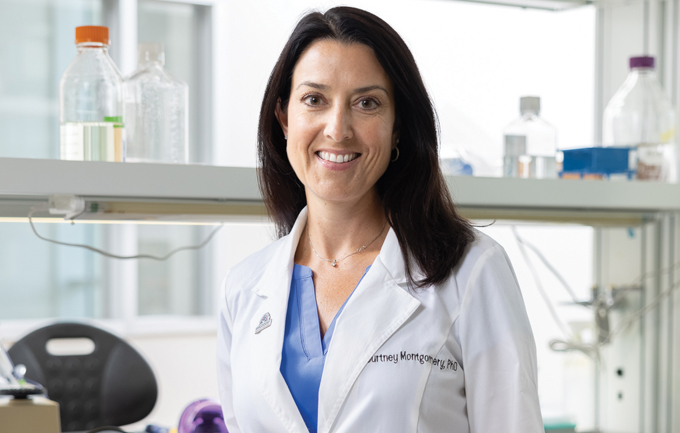People with African ancestry are three times more likely than those of primarily European descent to be diagnosed with an autoimmune disease called sarcoidosis, and they often experience more severe symptoms. However, research on the condition doesn’t reflect these statistics.
Oklahoma Medical Research Foundation scientist Courtney Montgomery, Ph.D., is working to change that.
“We can’t find answers for the people who need it unless we’re studying the right people,” Montgomery said.
Montgomery studies sarcoidosis, a painful inflammatory disease that causes immune cells to overreact and cluster together, forming tiny lumps. These cell clumps can develop in most organs but most often are found in the lungs.
Montgomery’s team recently published the first large-scale genetic study of African American lung fibrosis, or scarring of the lungs. They identified a new variant, or specific form of a gene, that contributes to the condition. It was previously undiscovered because researchers had only examined volunteers with European ancestry.
“We could have studied tens of thousands of European American people and only found one or two instances of this variant because it’s almost exclusively found in people with African ancestry,” Montgomery said. “This identification is a step toward understanding sarcoidosis progression and a new path for all other lung disease research in this population.”
Patrick Gaffney, M.D., who chairs OMRF’s Genes and Human Diseases Research Program, said similar differences are true for other autoimmune diseases like lupus. “Though 98% of our DNA is identical, that 2% can mean big differences, especially in complex diseases,” he said.
Montgomery’s lab also recently published a study that disrupts the previous understanding of sarcoidosis symptom patterns.
“In European Americans, some symptoms go hand-in-hand, which helps guide diagnosis and treatment,” Montgomery said. “Our findings showed that people with African ancestry don’t follow the same patterns.”
People with European ancestry who have sarcoidosis often experience clear clusters of affected organs, like in the liver and spleen, distinct from joint and skin. Montgomery said her lab does not see this same clear clustering in people of African ancestry.
Environment and lifestyle factors have their own influence, Montgomery said, but genetics play a big role in determining disease outcomes. “Our results suggest that ancestry should be a consideration when monitoring a patient’s progression and the organs that might become affected,” she said.
Highlighting the necessity of demographic-specific research is critical for advancing the partnership between scientists and underrepresented groups.
“It’s important that we’re able to publish research specific to those groups most affected by a particular disease so volunteers know their effort is going to help their children and grandchildren as well as the world,” Montgomery said.
For more information about OMRF’s sarcoidosis studies, visit omrf.org/sarcoidosis or contact OMRF at 405-271-2504 or [email protected].
Montgomery’s research was published in the American Journal of Respiratory and Critical Care Medicine and the journal Lung. The studies were supported by National Institutes of Health grants No. R01HL113326 and T32AI07633. Additional support came from Oklahoma Shared Clinical and Translational Resources.













